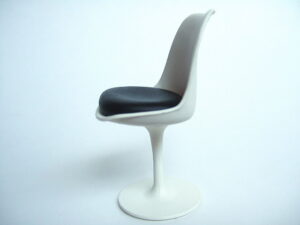
In a judgment of 7 October 2020, the French Supreme Court upheld the judgment of the Court of Appeal of Paris of 13 April 2018 that ruled that Knoll’s ‘Tulip’ chair is not protected by copyright in France. Under the reciprocity rule set out in Article 2(7) of the Berne Convention on works of applied art, the Court of Appeal sovereignly found that the famous Tulip chair is not eligible for copyright protection under the national law of the country of origin, i.e. US law, and therefore is not eligible for copyright protection in France. This rule of conflict is rarely used, which makes this case all the more interesting.
The US furniture company Knoll Inc. and its French subsidiary had brought a copyright infringement case against a French company that had sold eighty chairs which reproduced the characteristics of the Tulip chair created by Eero Saarinen. As the Court of Appeal of Paris explained in its judgment, under Article 2(7) of the Berne Convention (which provides that ‘Works protected in the country of origin solely as designs and models shall be entitled in another country of the Union only to such special protection as is granted in that country to designs and models; however, if no such special protection is granted in that country, such works shall be protected as artistic works’), it was necessary to ascertain:
- whether the United States copyright law protects the famous Knoll Tulip chair, in which case the law applicable to the benefit of protection is French copyright law, since protection is claimed in France (by application of Article 5(2) of the Berne Convention, which provides that the law of the signatory country where protection is sought has exclusive jurisdiction to determine the legal regime applicable to works of foreign origin);
- or whether, on the contrary, the United States protects the chair solely as a design and model, in which case under Article 2(7) the chair can only benefit from that special protection in France, and not copyright protection.
The Supreme Court upheld the judgment of the Court of Appeal which applied US copyright law, and in particular the judgment of the United States Supreme Court of March 22, 2017 Star Athletica, LLC v. Varsity Brands, and found that copyright protection is excluded under US law for a utilitarian object unless it contains separable artistic elements which can be considered in themselves as pictorial, graphic or sculptural works, in which case the protection extends only to those elements. The Court of Appeal stated that the shape of the Tulip chair and armchair meets functional objectives (i.e. limitation of construction costs, solidity and comfort for the user), and that no artistic element can be separated from the shape of the chair, therefore excluding copyright protection under US law. Thus, applying the rule of conflict of Article 2(7) Berne Convention, Knoll cannot seek copyright protection in France.
Article 2(7) of the Berne Convention therefore departs from the general system of national treatment set out in Article 5(1) of the Convention (i.e., equal treatment for foreign rightholders from a country of the Union), as it contains a rule of reciprocity under which a country of the Union grants national treatment only if the country of origin of the work also does so. Thus, there is a possible conflict between Article 2(7) of the Berne Convention and Article 18 of the Treaty on the Functioning of the European Union, which establishes a principle of non-discrimination on grounds of nationality. In Tod’s, a 2015 case in which the defendant had raised a plea of inadmissibility under Article 2(7) of the Berne Convention, contending that the Italian shoemaker Tod’s is not entitled to claim copyright protection in France for designs of shoes that do not qualify for such protection in Italy, the European Court of Justice ruled that Article 12 EC (which has become Article 18 of the TFEU) must be interpreted as meaning that the right of an author to claim in a Member State the copyright protection afforded by the law of that State may not be subject to a distinguishing criterion based on the country of origin of the work.
Article 18 of the TFEU is, however, no longer as important as it once was for European rightholders given the harmonization of European law in the field of copyright, and in particular the CJEU case law concerning the definition of originality (Infopaq and Painer).
________________________
To make sure you do not miss out on regular updates from the Kluwer Copyright Blog, please subscribe here.



Very interesting.
One might ask if the plaintiffs chose the right way for this particular matter. Maybe they should have started the litigation by alleging the infringement of the copyright under the French rules, not only did they have the copyright ownership presumption in their favour (with eliminates the necessity of the ownership proof), and an incredibly low originality threshold.
But, when plaintiffs asked for the application of the US Law in France, the case was lost. Varsity vs Star Athletica is cristal clear.